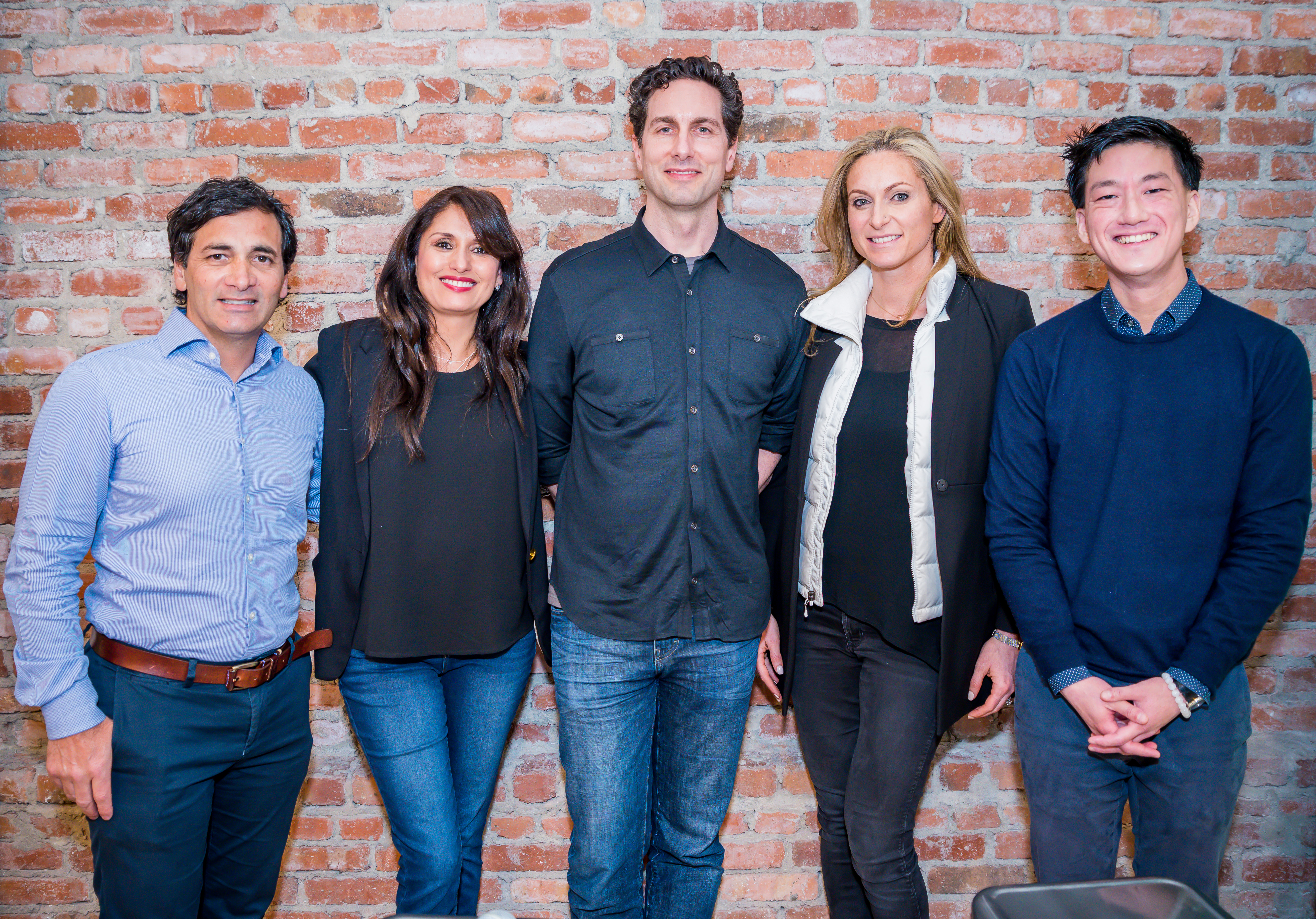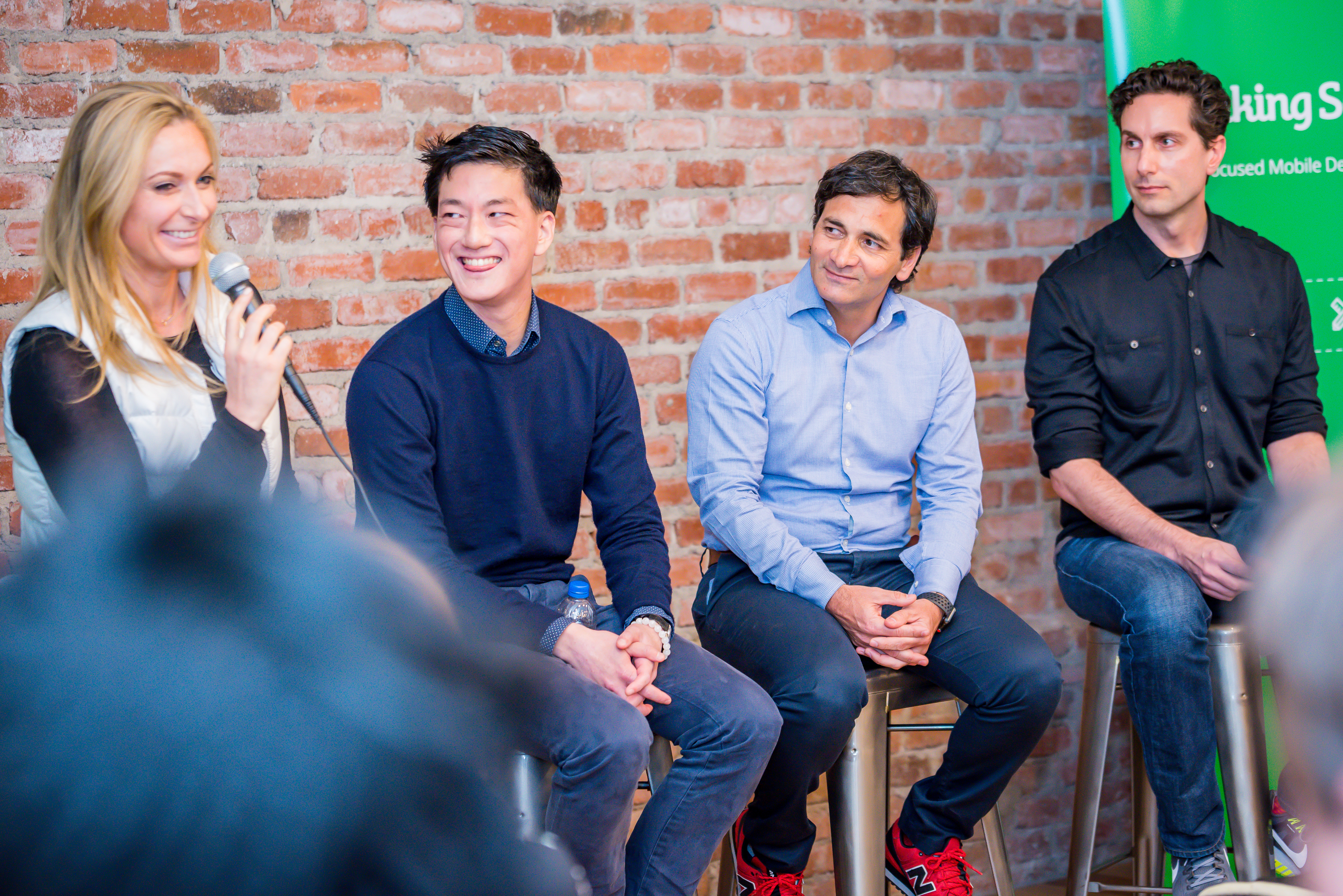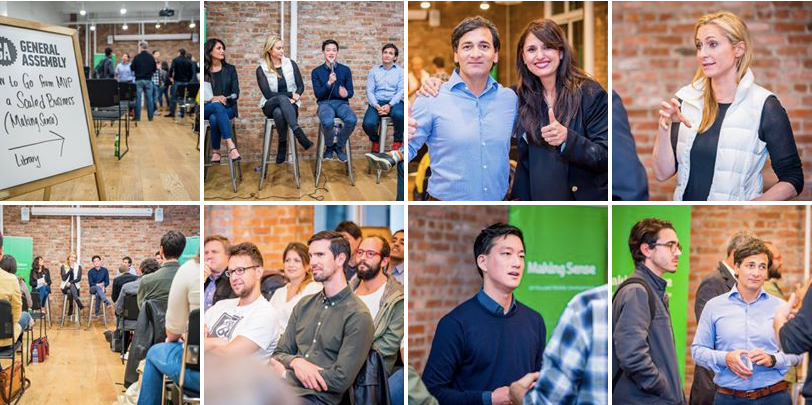After much anticipation, a new edition of Making Sense Meetups finally took place. Needless to say, we all enjoyed it immensely! The title of our Meetup was: “How To Go From Minimum Viable Product To a Scaled Business” and a great panel of experts joined us to explore topics like scalability, mistakes to avoid, and budgeting.
Since it worked out so well last year for our UX and MVP meetup, our gathering took place at General Assembly, San Francisco. We wanted everyone to enjoy themselves in a relaxed atmosphere where they could get some networking done while they attended the Meetup. Once again, this venue really delivered.
Elba Linscott, from Making Sense, opened the event by introducing the panel of experts. We’re proud to say they hailed from some pretty prestigious companies. Let’s meet them!
Our Speakers
We gathered Silicon Valley professionals who could provide a balanced discussion with the audience on the subject of scalability. To guarantee a diverse set of perspectives, we reached out to experts from startups and product development. The audience got to hear from a VC, 2 experienced startup founders, and a startup coach.
Pascale Diaine is Principal at Storm Ventures, where she focuses on early-stage enterprise SaaS, AI, and AR as applied to the B2B world. Previously, she worked at Orange (the European Telco) where she founded the corporate accelerator “Orange Fab” in San Francisco. There, she collaborated with seed stage startups (at the time) like Talkdesk (raised $25M), IUNU (recently raised $6M), and TrackR (raised $50M in series B).
Hikari Senju is Head of Growth at Yup. He is the founder of Quickhelp, which was acquired by Yup.com in March 2017. Hikari started Quickhelp while he was at Harvard, where he graduated with a degree in Computer Science in 2015. Quickhelp helped tens of thousands of university students get high-paying jobs in online tutoring by connecting them with top online English learning platforms in Asia. After the sale, Hikari was named Head of Growth at Yup, where he manages a multi-million dollar annual marketing budget. In that role, he has helped drive down the cost of acquiring a paying customer by 90%.
Tristan Kromer is Lean Startup Coach & Advisor at Kromatic, a company that provides Lean Coaching & Innovation Ecosystem Design. He works with innovation teams and leaders to create amazing products and build startup ecosystems. He has worked with all kinds of companies, from early-stage startups with zero revenue to enterprise companies with >$1B USD revenue. (Swisscom, Pitney Bowes, Fujitsu, LinkedIn).
Cesar Donofrio, CEO at Making Sense, was on the panel as well. For more than 20 years, Cesar has been applying leadership combined with his expertise in software development and User Experience. He and his brother founded Making Sense in 2006. Making Sense is a UX-focused software development company with more than 170 employees and 3 software products, one of which was awarded and later on, acquired by a company from San Mateo, CA.
So, introductions made, we’re all set. Let’s take a look at the highlights of our panel’s conversation!

The Meetup
For this Meetup, we had one goal in mind: to hear from our panel members on how they provide the necessary tools and concepts to ensure scalability after an MVP. Each panel member proved to be very inspirational, offering different perspectives on the topic and sharing their experience in regards to three main themes:
- Culture
- Team
- Funding
Highlights of the Discussion
Cesar Donofrio and Hikari Senju focused on the importance of your team and your company’s culture.
Cesar mentioned his experience with creating SaaS products and pointed out some common mistakes that hurt their scalability. In his experience, one problem stemmed from initiating a product using only the resources that Making Sense had on the bench. That resulted in their product becoming sluggish as time went by and more users came on board. The solution was to build the app from scratch, which took two years. The pro tip here is to have a great and experienced team from Day One of development. Then, if you need to scale, you can do so without problems.
Pascale added an important note. Once you have some funding, you might go and run and hire an experienced VP of sales. She says this would be another mistake. She pointed out the importance of building your sales and marketing team gradually from the beginning. Only then, after you’ve built your team and defined each phase of the project, can you effectively articulate the overall sales process.
Pascale suggests first hiring a person who can listen to your client and construct a path. Then, and only then, can you hire someone who can “fight on the battlefront”, a “braveheart”, as she called it, who can follow the path and the strategies set beforehand. And finally, you’ll need to hire a person who is going to help you grow geographically, inch by inch, in your sales process.

Your Team: Can it Help or Hurt Scalability?
In terms of building a scalable team, Hikari suggested focusing on the people in your company. “Your people are your asset”. He stresses the importance of nurturing your people, investing in them and giving them the space they need to create their best work.
He pointed out that the future of the company is determined by the millions of micro decisions that your people are making on a daily basis. Those decisions will make or break your company. It is very important to value them and make sure this is a priority. The team is what comes first. You need a great team because it’s how you build a great product.
Next, Cesar highlighted the importance of two things:
- Having a team that can grow in parallel with the company
- Being prepared to make important decisions
If you are able to scale, you need to keep track of your team’s performance so you know who’s running at the same level as the company. If there’s someone who doesn’t fulfill that objective, that’s when you have to make that all-important decision.
Tristan added: “whatever problem you have on your team today, it will become magnified when the company grows”.
Pascale spoke about the importance of delivering. “When you start, you are the CEO, you make the decisions, the phone calls, etc. But as you start growing, you need to start delivering”. And to do that you need a team of superheroes who can save you in any situation. You need to have your marketing superhero, your sales superhero, and you need to evolve with them as well. But “if people don’t change, you need to change the people, and that must be a CEO’s decision”.
Interesting, right?
When we asked the panel to share their important thoughts and best practices, Hikari highlighted one more, the importance of culture. As your team grows, the importance of culture becomes critical and you have to make sure that people are making decisions in the right direction.
Cesar talked about being passionate (that goes for your team as well). For sure, things will get complicated down the road so you have to make sure that you and your team have passion for what you’re doing. He added: “try to be the best in your area.”
Profits vs Growth
Should startups prioritize profits or growth? The most experienced panelists in this area agreed that if your plan is to raise funds you should focus on growth over profits. The purpose of a startup is, after all, to grow.
Profits are great, but that’s not what the VC’s care about. The VC is interested in your sales efficiency: how many dollars do you devote to sales and marketing and how many dollars does that return on growth?
How to Build For Growth While Staying on Budget
Tristan recognized that if you are bootstrapping, you should stay focused on the ‘real stuff’.
Pascale mentioned that VC’s like to invest in what they call ‘product-market fit’. Once you’ve found that market fit and you’ve raised money, everything changes. You need to move quickly. If you don’t move as quickly as possible, your competitors are going to catch up with you. What saved you in the survival phase can kill you in the growth phase and the thrive phase.
Watch the Video!
Missed the meetup? Here’s the video:
With so many amazing concepts being discussed and with such an inspired group of experts on the panel, attendees had a lot to say and they asked tons of questions. We topped it all off with some drinks and pizza — the perfect way to end a great day and another great Meetup. Can’t wait for the next one!

